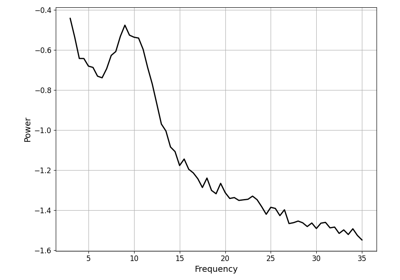specparam.results.results.Results¶
- class specparam.results.results.Results(modes=None, metrics=None, bands=None)[source]¶
Object for managing results - base / 1D version.
- Parameters:
- modesModes
Modes object with fit mode definitions.
- metricsMetrics
Metrics object with metric definitions.
- bandsBands or dict or int or None
Bands object with band definitions, or definition that can be turned into a Bands object.
- Attributes:
- modesModes
Modes object with fit mode definitions.
- bandsBands
Bands object with band definitions.
- modelModelComponents
Manages the model fit and components.
- paramsModelParameters
Manages the model fit parameters.
- metricsMetrics
Metrics object with metric definitions.
Methods
__init__([modes, metrics, bands])Initialize Results object.
add_bands(bands)Add bands definition to object.
add_metrics(metrics)Add metrics definition to object.
add_results(results)Add results data into object from a FitResults object.
get_metrics(category[, measure])Get requested metric(s) from the object.
get_params(component[, field, version])Return model fit parameters for specified feature(s).
Return model fit parameters and metrics.
Attributes
Indicator for if the object contains a model fit.
The total number of parameters fit in the model.
How many peaks were fit in the model.
- add_bands(bands)[source]¶
Add bands definition to object.
- Parameters:
- bandsBands or dict or int or None
How to organize peaks into bands. If Bands, defines band ranges, if int, specifies a number of bands to consider. If dict, should be a set of band definitions to be converted into a Bands object. If None, sets bands as an empty Bands object.
- add_metrics(metrics)[source]¶
Add metrics definition to object.
- Parameters:
- metricsMetrics or list of Metric or list of str or None
Metrics definition(s) to add to object. If None, initialized with default metrics.
- add_results(results)[source]¶
Add results data into object from a FitResults object.
- Parameters:
- resultsFitResults
A data object containing the results from fitting a power spectrum model.
- get_metrics(category, measure=None)[source]¶
Get requested metric(s) from the object.
- Parameters:
- If ‘all’, returns all available metrics.
- measurestr, optional
Name of the specific measure(s) to return.
- Returns:
- metricsdict
Dictionary of requested metrics.
- get_params(component, field=None, version=None)[source]¶
Return model fit parameters for specified feature(s).
- Parameters:
- component{‘aperiodic’, ‘periodic’}
Name of the component to extract parameters for.
- fieldstr or int, optional
Column name / index to extract from selected data, if requested. If str, should align with a parameter label for the component fit mode.
- version{‘fit’, ‘converted’}
Which version of the parameters to extract.
- Returns:
- outfloat or 1d array
Requested data.
- Raises:
- NoModelError
If there are no model fit parameters available to return.
Notes
If there are no fit peaks (no periodic parameters), this method will return NaN.
- get_results()[source]¶
Return model fit parameters and metrics.
- Returns:
- FitResults
Object containing the model fit results from the current object.
- property has_model¶
Indicator for if the object contains a model fit.
Notes
This checks the aperiodic params, which are necessarily defined if a model has been fit.
- property n_params¶
The total number of parameters fit in the model.
- property n_peaks¶
How many peaks were fit in the model.
